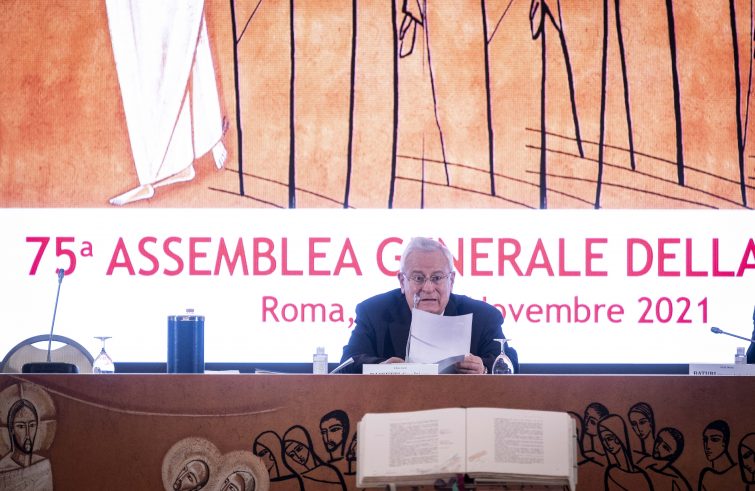
With regard to the pandemic, “the news we are receiving from neighbouring countries is far from reassuring”, said Card. Gualtiero Bassetti, archbishop of Perugia-Città della Pieve, President of the Italian Bishops’ Conference, in his opening address to the Extraordinary General Assembly of the Italian Bishops, taking place in Rome until November 25. “The rising number of infections, which we are also seeing in Italy, requires a greater sense of responsibility on the part of everyone”, is the appeal of the Italian Church: “now an additional effort is needed to overcome the second difficult winter, in Italy and worldwide”
“The divisiveness of conflicting camps weakens both society’s resilience and the cordon sanitaire that has enabled us to protect the most fragile among us and significantly contain the number of victims”,
the analysis of Bassetti: “Let us remember the youngest, who can neither enjoy social interaction at school nor the freedom of playing together; let us be mindful of the elderly, frequently constrained to greater isolation and the burden of loneliness; let us be close to those who are struggling to provide for their families. These same concerns have been voiced on many occasions by the President of the Republic, Sergio Mattarella, to whom we express our gratitude for his service to the country over the past seven years.”
Abuses and mistreatment. “Sadly, we are seeing repeated cases of oppression and abuse of the human person”, was the cry of alarm regarding another sensitive issue, concerning “news reports revealing dramatic developments that cannot be ignored.” “In communion with the Pope, over the past few weeks we have drawn attention to the situation in Libya”, is the appeal of the President of Italian bishops. In his opening address, His Eminence thanked the Holy Father for the attention reserved to the bishops in the strictly private meeting that took place on Monday afternoon, and for his forthcoming presence at the meeting with the Mediterranean bishops, scheduled to take place in Florence on 23-27 February 2022:
“My thoughts go to the ongoing situation of migrant people stranded on the Poland-Belarus border, and to those who venture across the Mediterranean from the Maghreb shores. These incidents have nothing to do with the European culture inspired by the Gospel.”
“Among the most vulnerable,” stressed the cardinal,
“my thoughts go to those who have been victims of physical and psychological abuse, even in our midst.
These are persons scarred by wounds that will take a long time and much pain to be healed. The Day of Prayer for Victims and Survivors of Abuse, instituted by the Permanent Episcopal Council, which we celebrated a few days ago, is yet another tangible sign of the attention and closeness of our Church: we are close to the weakest!”.
Young people leaving the country. Reference was also made to the Social Week in Taranto that ended a month ago and saw the participation of many young people, whose presence testified to the fact that the tragic situation facing our planet “is not irreversible”, provided, however, that we reverse course. “Every year, thousands of young Italians leave their homes to seek their fortunes abroad”, was Bassetti’s cry of alarm:
“Many are struggling to find a job here or are discouraged to the point of not trying to find a job or not completing their studies for this purpose.” “We cannot stand idly by in the face of a social and environmental context that risks clipping the wings of our young people and impoverishing numerous communities, which are destined to disappear without generational change,
the appeal of the Italian Church: “Hopefully, the themes discussed in Taranto will be the object of in-depth reflection and will lead to practical decisions also at the ecclesial level; at the same time, they could offer a glimmer of hope for some disadvantaged areas of Italy.”
Collegiality and creativity. “The call of the Lord to preach the Gospel and the steadfast communion among us, cum Petro et sub Petro: that is our ordinary life, our everlasting breath.” The central part of Cardinal Bassetti’s introduction focuses on the Synodal journey of the Churches in Italy and the Universal Synod, “an occasion for renewed and deeper awareness of our pastoral role”, the cardinal noted: “Pope Francis impels us towards a greater care for our people. And is this not precisely the ecclesiology of Vatican II, stating that the Church is the ‘people of God’?” “In the past decades we have devoted considerable effort, not without fatigue, to the dimension of Episcopal collegiality,” the cardinal said. “The Synodal journey requires us to
take a further step towards bringing the collegiality we experience among us to a stage of synodality involving all members of the Church.
We have the opportunity to involve all believers, including the lukewarm among them, making them feel that they are not ancillary or mere recipients, but rather essential to the life of the Church.” From this perspective, the President of the Italian Bishops’ Conference said that the synodal journey is “a great opportunity for growth not only for us shepherds, but for the Church as a whole. It involves changing the direction of thought: no longer those who only speak and those who only listen. We listen to one another, and most of all, we are listeners to the Holy Spirit. We are all journeying towards growth.” Therefore, the Synod is “an opportunity not to be missed for laying the foundations of attentive listening to the Spirit and to all the voices of the Church. No one is exclusively a teacher and no one is exclusively a learner: we listen to each other, we learn and we grow together.” In the closing remarks, a concrete proposal: to extend the Synodal journey also to “persons who, although not fully integrated in the life of the Church, have something important to say.”











